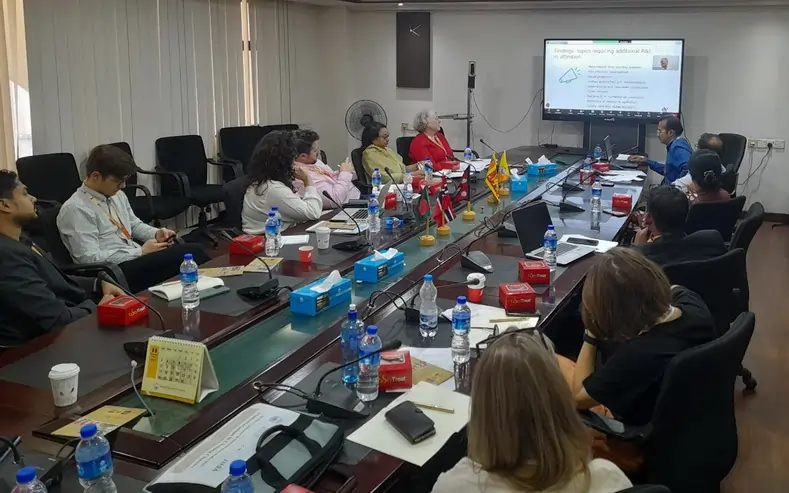
Here are the key takeaways from a recent roundtable discussion hosted by the All India Disaster Mitigation Institute (AIDMI) in partnership with Elrha and Deakin University at the World Conference on Humanitarian Studies in Dhaka, Bangladesh, on November 5, 2023. Established in India in 1988-89, AIDMI is one of the first local action-research organisations that promotes convergence between humanitarian action, disaster risk reduction, and climate change adaptation.
In the pursuit of enhancing humanitarian response, R&I has the potential to improve the way the humanitarian sector uses evidence, identifies and scales solutions and, in turn, contributes to the improvement of the lives of people impacted by crises.
As part of the Global Prioritisation Exercise (GPE) for humanitarian research and innovation (HRI), we conducted regional consultations in the South Asia region, and the preliminary findings of this exercise were discussed by experts representing a range of perspectives, including operational specialists and academics at the roundtable.
| Colette Fearon, Director of Impact and Engagement, Elrha, chairing the roundtable, underscored the need for substantial financing. |
The panellists shared the following useful insights on solutions for addressing humanitarian needs in the South Asia region:
1. GREATER FUNDING FOR CREATIVE SOLUTIONS
Colette Fearon, Director of Impact and Engagement, Elrha, chairing the roundtable, underscored the need for substantial financing. This is essential to support the research process and encourage creative thinking. Adequate financial resources enable in-depth analysis of problems and allow humanitarian actors to pilot test and evaluate new ideas. Additionally, increased funding can improve access to technology and necessary tools, leading to more effective results. However, these resources should be sustainable and flexible so that humanitarian actors can be encouraged to undertake long-term initiatives while supporting the adoption and expansion of successful innovations.
2. IMPROVED COORDINATION FOR IMPACT
Enhancing coordination among humanitarian actors engaged in R&I is vital for creating comprehensive datasets and verified information. Collaboration among stakeholders, including government institutions, non-profit organisations (NPOs), academics, and the private sector, could optimise resource utilisation, minimise redundancy, and promote well-targeted humanitarian efforts. Cross-sector collaboration facilitates resource pooling, sharing best practices, and efficient data exchange.
3. HOLISTIC THINKING FOR EFFECTIVE SOLUTIONS
Shifting from siloed thinking to a holistic approach is crucial. Humanitarian actors must consider all factors of a crisis and the diverse needs of affected people. This inclusive approach should cut across sectors and institutional boundaries and will help with understanding the context and planning responses accordingly. Collaborating across disciplines is essential for impactful research innovations.
| “The consultations revealed the role of R&I in building the quality of humanitarian actions by contextualisation, culturally appropriate response, predicting and forecasting effectively, improving sector functions, enabling better outcomes, addressing reporting barriers, and suggesting various ways for timely actions,”
said Mihir R. Bhatt, Director, AIDMI. |
4. IMPACTFUL DISSEMINATION AND FEEDBACK
Effective dissemination of R&I results is key to encouraging application. Real-time feedback enhances research implications and identifies areas for improvement. Therefore, well-organised and robust feedback systems are recommended for humanitarian organisations to fine tune the focus of their actions and improve continuously.
| “It becomes very crucial to understand the perspectives of stakeholders, talking to the people, talking to different intersections of population and to understand,”
said Prof. Mahbuba Nasreen, Dhaka University. |
5. ENABLING ENVIRONMENT FOR R&I CULTURE
To attract talent, humanitarian agencies must create an enabling environment and offer attractive incentives. Organisations can encourage creative thinking and help young professionals explore opportunities for development and growth. By fostering enabling environments, agencies should prioritise establishing sustainable systems that identify and nurture innovations. It may entail setting up innovation labs, crisis-monitoring centres, recognition programmes, and initiatives that encourage a culture of innovation.
| “We need a higher investment of R&I at the local level than the national level,”
said Sajid Raihan, County Manager Bangladesh, Start Fund. |
6. CAPACITY DEVELOPMENT FOR INFORMED DECISION MAKING
There is a need to enhance the capacities and equip humanitarian actors involved in R&I with the necessary skills and knowledge. This encompasses providing educational training and introducing them to new tools, methods, and technology. It also entails long-term investments in R&I initiatives by donors. Investment in the capacity development of humanitarian professionals enables them to stay up to date with the latest knowledge and technology to make informed decisions and design more effective humanitarian responses.
Engagement of communities came out as a key point from the roundtable discussion. By embracing these insights, the humanitarian sector can make use of the potential of R&I to address the challenges in South Asia and beyond.
Watch the recording of the roundtable.